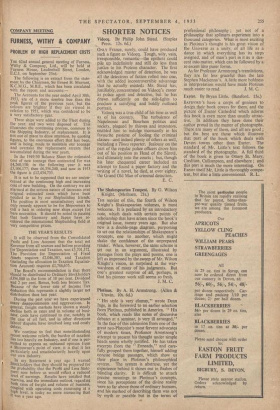" His style is very clumsy," wrote Dean Inge, in
the foreword to an earlier selection from Plotinus, published in America. " His book, which reads like notes of discursive debates at a seminar, is very ill arranged." In the face of this admission from one of the great neo-Platonist's most fervent advocates of modern times, Professor Armstrong's attempt to present his thought under simple heads seems wholly justified. He has taken excerpts from the " Enneads," and care- fully grouped them together, himself adding concise bridge passages, which show us their place in Plotinus's philosophical system. The system . is abstruse, yet the experience behind it shines out in flashes of blinding clarity. It is difficult to attach precise meanings to Plotinus's concepts, since his perceptions of the divine reality were so far above those of ordinary humans, and his method of describing them was not by myth or parable but in the terms of professional philosophy ; yet not of a philosophy that splinters experience into a thousand categories. What is most exciting in Plotinus's thought is his great vision of the Universe as a unity, of all life as a dance in which everything has its steps assigned, and of man's part in it as a des- cent into matter, which can be followed by a. re-ascent into purer forms.
As for Professor Armstrong's translations, they are far less graceful than the late Stephen Mackenna's. A little more boldness in interpretation would have made Plotinus


































 Previous page
Previous page